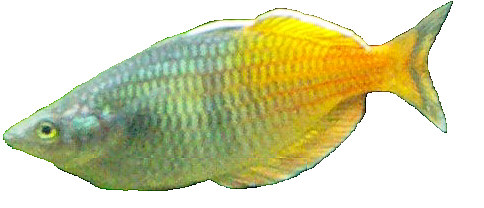



Details of all species referred to in these Fish Care Sheets can be found in the FBAS Booklet No 6 - National Show Fish Sizes. Click HERE for information.

Rainbowfish (1) 01/03/2002
Species: Chilatherina, Glossolepis, Melanotaenia, Bedotia and
Marosatherina
.
See those fishes listed in the current Federation Size Book
under Classes Mc and M.
Family: Atheriniformes.
Geographic Origin: Papua New Guinea, Irian Jaya, Australia.
Common Name: Rainbowfish.
Compatibility: Can be aggressive with small fishes. With similar sized fish,
these constantly active fish are fine.
Minimum aquarium size: A minimum of 90mm x 380mm x 300mm
(36” x 15” x 12”) aquarium is necessary.
If you intending to keep a few species, a larger tank
is necessary.
Temperature: Fairly wide range in their requirements.
From 18o/28oC (65oF/82oF).
Habitat: Prefers a well planted tank, with some water movement created by an
airstone or filtration.
Water Parameters: Very undemanding. Providing the water is clean and clear,
they will accept hard and soft water. A water change of
25% each week is beneficial if not essential.
Health: Generally free from health problems. May get a slight touch of
Mouth Fungus if they damage that area. Treat as necessary in a
separate quarantine aquaria. Do not flush dead fish down the toilet.
Incinerate or wrap in paper and put in the dustbin.
Diet: Omnivorous. All types of dried, frozen and live foods such as Daphnia
and Tubifex worms. Vary the diet and do not overfeed.
Plants: All species of tropical plants are acceptable in the aquarium.
These species do not eat plants.
Breeding Notes : Spawning straightforward with the adults laying eggs
amongst fine-leaved plants or
mops. Eggs hang on plants by
means of sticky threads.
Well-fed adults are said not to
eat the eggs.
Availability: Many species are widely available. Only select fish that are alert
and swimming with fins erect. Inspect carefully for signs of
disease. Reject lethargic, damaged or hollow bellied specimens.
Show Class: FBAS Classes Mc or M.
© FBAS 2002. PWC/RDE. Fish Care Sheet 22 1/1
Download this Care Sheet Photographs
Aquarium Management Care Sheet Index
Last updated October 2016
Fish Care Sheet Index
Pond Care Sheet Index